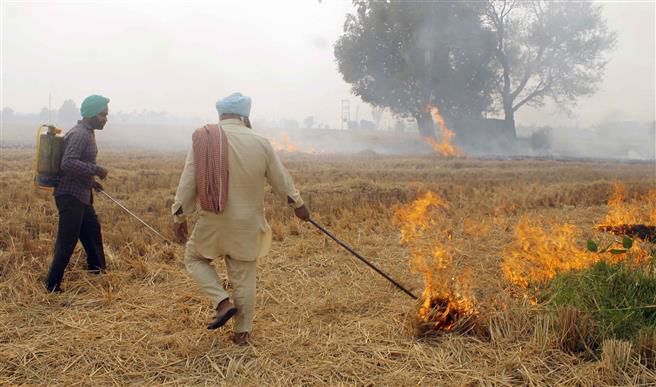Blaming Punjab farmers for Delhi’s air pollution unfair: NGT member Justice Sudhir Agarwal
Neeraj Mohan
New Delhi, July 2
National Green Tribunal (NGT) member, Justice Sudhir Aggarwal, voiced his skepticism over the widely held belief that stubble-burning in Punjab significantly contributes to air pollution in Delhi.
Speaking at a conference on ‘Environment-Friendly Paddy Cultivation’, Justice Agarwal underscored the lack of scientific evidence to substantiate these claims.
“Neither is there a scientific study to establish this claim, nor is it practical to prove that the smoke from Punjab is causing pollution in Delhi,” Justice Agarwal said, emphasizing the need for thorough research to determine the actual causes of air pollution in the region.
Highlighting the injustices faced by farmers, he argued, “Blaming the farmers, registering cases against them, and imposing penalties is very unjust. Most farmers are not educated, and changing their mindset takes time. There is a need to visit every village and hold several awareness programmes instead of penalising them.”
Justice Agarwal reiterated that farmers play a crucial role in maintaining the environment. “Farmers have the responsibility to maintain the greenery on the earth. Environment is directly linked to agriculture,” he said, stressing the importance of surface soil and sustainable farming practices.
Reflecting on his tenure at the NGT, Justice Agarwal said, “Since I joined the NGT three years ago, I was told that stubble-burning causes pollution. Earlier, I was not aware of it. About 20-25 years ago, air pollution was not attributed to stubble-burning. Blaming farmers for every issue is beyond my understanding. Is there any scientific study to prove that? Nobody has an answer.”
He questioned the geographical plausibility of the claim, noting, “Punjab is not attached to Delhi’s border geographically. Around three-fourths of Delhi’s borders are connected with Haryana, and the remaining is linked with UP, with a very short area connected to Rajasthan. UP and Haryana are located in different directions, and Punjab is in the north. How does the smoke from Punjab come directly to Delhi and pollute the air without affecting other regions?”
Justice Agarwal called attention to the wind patterns, saying, “For the smoke to reach Delhi, the air flow direction should be North to South, which is very rare, according to the meteorological department. The smoke from stubble-burning needs wind velocity to carry it, and Delhi’s air flow cannot push its own smoke to Ghaziabad. Moreover, tests reveal that Delhi’s air pollution has higher oil content, whereas paddy residue is biodegradable with negligible oil content. So, what is the source of the oil content in Delhi’s air pollution?”
He suggested that the issue might have political underpinnings and emphasised the need for a detailed study on how smoke from Punjab could reach Delhi. “Crop residue management is a major challenge, but the efforts being made are not up to the mark. There is more show than actual work. It requires an in-depth study to understand how the smoke from Punjab comes to Delhi. There might be some political reasons behind this, as stopping air pollution is our responsibility. Efforts should also be made to stop air pollution at the source and local level,” Justice Agarwal concluded.
In his address, senior advocate HS Phoolka said the country’s food bowl of Punjab and Haryana may face severe ground water crisis if the timely measures are not taken. He said the diversification efforts failed to yield any result to deal with the depleting ground water; therefore, there is need to promote eco-friendly cultivation as well, as the diversification alone could not help. He urged the farmers to adopt the drill sowing of rice as the best alternative to paddy cultivation as it takes 90% less ground water than the traditional method.









